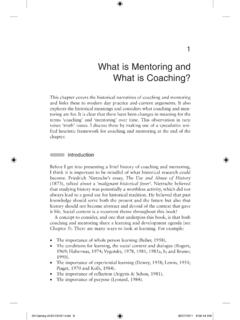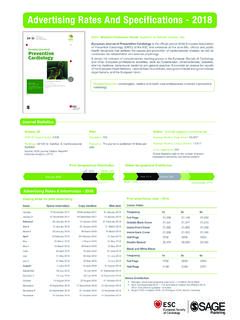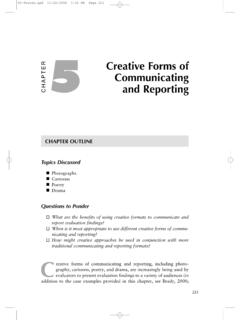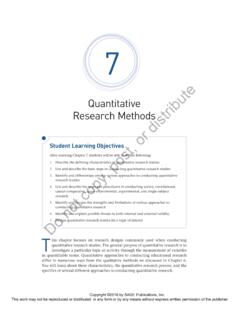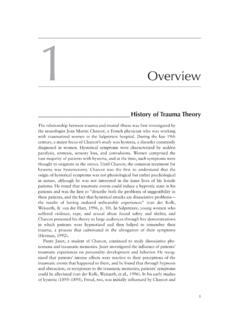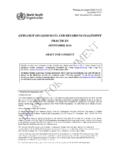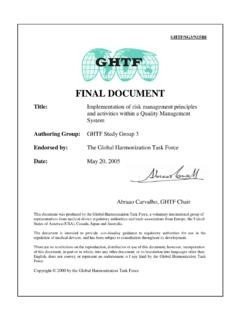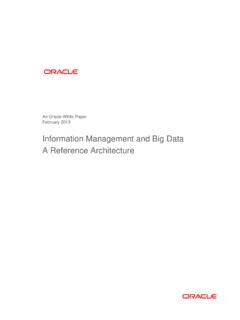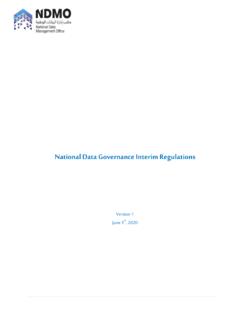Transcription of PRINCIPLES˜OF˜EDUCATIONAL LEADERSHIP AND …
1 LEADERSHIPANDMANAGEMENTPRINCIPLES OF 125/03/2019 12:12:52 PMSara Miller McCune founded SAGE Publishing in 1965 to support the dissemination of usable knowledge and educate a global community. SAGE publishes more than 1000 journals and over 800 new books each year, spanning a wide range of subject areas. Our growing selection of library products includes archives, data, case studies and video. SAGE remains majority owned by our founder and after her lifetime will become owned by a charitable trust that secures the company s continued Angeles | London | New Delhi | Singapore | Washington DC | 225/03/2019 12:12:52 PMLEADERSHIPANDMANAGEMENTTONY BUSH, LES BELL ANDDAVID MIDDLEWOODTHIRD EDITIONPRINCIPLES OF EDUCATIONALEDITED 325/03/2019 12:12:52 PMAt SAGE we take sustainability seriously.
2 Most of our products are printed in the UK using responsibly sourced papers and boards. When we print overseas we ensure sustainable papers are used as measured by the PREPS grading system. We undertake an annual audit to monitor our Publications Ltd1 Oliver s Yard55 City RoadLondon EC1Y 1 SPSAGE Publications Teller RoadThousand Oaks, California 91320 SAGE Publications India Pvt LtdB 1/I 1 Mohan Cooperative Industrial AreaMathura RoadNew Delhi 110 044 SAGE Publications Asia-Pacific Pte Ltd3 Church Street#10-4 Samsung HubSingapore 049483 Editor: James ClarkAssistant editor: Diana AlvesProduction editor: Nicola CarrierCopyeditor: Jill BirchProofreader: Thomas BedfordMarketing manager: Dilhara AttygalleCover design: Naomi RobinsonTypeset by.
3 C&M Digitals (P) Ltd, Chennai, IndiaPrinted in the UK Tony Bush, Les Bell and David Middlewood 2019; Chapter 1 Tony Bush 2019; Chapter 2 Philip Hallinger 2019; Chapter 3 Mike Bottery 2019; Chapter 4 Megan Crawford 2019; Chapter 5 Viviane Robinson 2019; Chapter 6 Les Bell 2019; Chapter 7 David Middlewood 2019; Chapter 8 David Middlewood 2019; Chapter 9 Raj Mestry 2019; Chapter 10 Tony Bush and Carmen Montecinos 2019; Chapter 11 Pontso Moorosi 2019; Chapter 12 Jacky Lumby 2019; Chapter 13 Paul Miller 2019; Chapter 14 Michael Connolly, Catherine Farrell and Chris James 2019; Chapter 15 Alma Harris and Michelle Jones 2019; Chapter 16 Howard Stevenson 2019; Chapter 17 Philip Hallinger 2019; Chapter 18 Allan Walker and Qian Haiyan 2019; Chapter 19 Felix Maringe and Nevensha Sing 2019; Chapter 20 Tom O Donoghue and Simon Clarke 2019 First edition published 2002, reprinted 2006 once, 2008 once, 2009 three times.
4 Second edition published 2010, reprinted 2010 once, 2011 once, 2014 twice, 2015 once, 2016 once, 2017 once. This third edition published from any fair dealing for the purposes of research or private study, or criticism or review, as permitted under the Copyright, Designs and Patents Act, 1988, this publication may be reproduced, stored or transmitted in any form, or by any means, only with the prior permission in writing of the publishers, or in the case of reprographic reproduction, in accordance with the terms of licences issued by the Copyright Licensing Agency. Enquiries concerning reproduction outside those terms should be sent to the of Congress Control Number: 2018958052 British Library Cataloguing in Publication dataA catalogue record for this book is available from the British LibraryISBN 978-1-5264-3173-8 ISBN 978-1-5264-3174-5 (pbk) 425/03/2019 12:12:53 PMCONTENTSP reface viiAbout the Editors xiiiAbout the Contributors xvPart I principles of Educational LEADERSHIP and management 11 Models of Educational LEADERSHIP 3 Tony Bush2 Instructional LEADERSHIP 1950 2018.
5 Transformation from an American to a Global LEADERSHIP Construct 19 Philip Hallinger 3 An Ethics of Educational LEADERSHIP for Turbulent and Complex Times 39 Mike Bottery4 Solo and Shared LEADERSHIP 57 Megan Crawford5 Excellence in Educational LEADERSHIP : Practices, Capabilities and Virtues that Foster Improved Student Outcomes 73 Viviane RobinsonPart II LEADERSHIP , management and Professionalism 936 Leading and Managing Professional Learning 95 Les Bell7 Leading and Managing Professional Staff 117 David Middlewood8 Appraisal and Performance management 133 David Middlewood9 Resource management 149 Raj 525/03/2019 12:12:53 PMvi Contents10 LEADERSHIP Preparation and Development 165 Tony Bush and Carmen MontecinosPart III LEADERSHIP for Social Justice 18111 Gender and Educational LEADERSHIP 183 Pontso Moorosi12 LEADERSHIP for Diversity and Inclusion 205 Jacky Lumby13 Race and Ethnicity in Educational LEADERSHIP 223 Paul Miller14 The Participation and Influence of Stakeholders in School LEADERSHIP and management 239 Michael Connolly.
6 Catherine Farrell and Chris James15 Leading Schools in Challenging Circumstances 259 Alma Harris and Michelle JonesPart IV LEADERSHIP and Context 27316 LEADERSHIP and Globalisation 275 Howard Stevenson17 Contextualising the Study and Practice of School LEADERSHIP in an Era of Globalisation 291 Philip Hallinger18 LEADERSHIP and Culture 311 Allan Walker and Qian Haiyan19 School LEADERSHIP in Developing Countries: The Case of South Africa 331 Felix Maringe and Nevensha Sing20 Educational LEADERSHIP in Post-Conflict Situations: A Brief Reconnoitre 357 Tom O Donoghue and Simon ClarkeAuthor Index 373 Subject Index 625/03/2019 12:12:53 PMPart IPRINCIPLES OF EDUCATIONAL LEADERSHIP AND 123/03/2019 10:13:16 223/03/2019 10:13:16 AM1 MODELS OF EDUCATIONAL LEADERSHIPTony BushIntroduction: The Significance of Educational LeadershipIt is widely recognised that LEADERSHIP is second only to classroom teaching in its impact on student learning.
7 Leithwood et al. s (2006) widely cited report shows that LEADERSHIP acts as a catalyst ( ) for beneficial effects, including pupil learning. Their conclusion, that there is not a single documented case of a school successfully turning around its pupil achievement trajectory in the absence of talented LEADERSHIP , offers powerful support for the vital role of heads, senior and middle leaders in all types of of Educational LeadershipGunter (2004) shows that the labels used to define this field have changed from educational administration to educational management and, more recently, to educational LEADERSHIP .
8 Bush (2008) discusses whether such changes are purely semantic or reflect substantive changes in the nature of the field. Yukl 323/03/2019 10:13:16 AM4 principles of Educational LEADERSHIP and management (2002: 4) argues that the definition of LEADERSHIP is arbitrary and very subjec-tive , but the following working definition includes its main features: LEADERSHIP is a process of influence leading to the achievement of desired purposes. Successful leaders develop a vision for their schools based on their personal and professional values. They articulate this vision at every opportunity and influence their staff and other stakeholders to share the vision.
9 The philosophy, structures and activities of the school are geared towards the achievement of this shared vision. (Bush & Glover, 2003: 5)Three dimensions of LEADERSHIP arise from this working as influenceLeadership involves a social influence process whereby intentional influence is exerted by one person [or group] over other people [or groups] to structure activities and relationships in a group or organisation (Yukl, 2002: 3). Bush (2008: 277) refers to three key aspects of these definitions. First, the central concept is influence rather than authority. Both are dimensions of power but the latter tends to reside in formal positions, such as principal or head teacher, while the former could be exercised by anyone in the school or college.
10 LEADERSHIP is independent of positional authority while management is linked directly to it. Second, the process is intentional. The person seeking to exercise influence is doing so in order to achieve certain purposes. Third, influence may be exercised by groups as well as individuals. This notion pro-vides support for the concept of distributed LEADERSHIP and for constructs such as senior LEADERSHIP and valuesThe notion of influence is neutral in that it does not explain or recommend what goals or actions should be pursued. However, LEADERSHIP is increasingly linked with values. Leaders are expected to ground their actions in clear personal and professional values.

